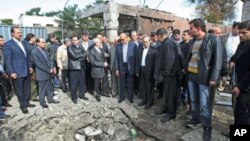The United States is condemning Friday’s car bombings in Damascus and says it is crucial that the terror attacks not hinder the Arab League mission now arriving in Syria to monitor human rights abuses. Analysts say the monitoring force is too small given the widespread anti-government unrest in Syria.
The twin car bombings - at what were described as state security sites in Damascus - killed about 40 people and further complicated what U.S. officials see as a critical observer mission by the Arab League.
The Syrian government attributed the blasts to al-Qaida. The attacks came a day after the arrival of the first members of a human rights monitoring force from Arab states.
Syria's stalling tactics
Syria resisted international pressure to accept the observers for six weeks before agreeing last Monday to allow a smaller mission than first envisioned. The force will have just over 100 people, many of them military personnel.
The State Department condemned the bombings “in the strongest terms” and said there can be no justification for terrorism of any kind.
Spokesman Mark Toner said it is crucial that Friday’s attack not impede the work of the Arab League mission, the first outside observers allowed in since the Syrian government began cracking down on protesters nine months ago.
“Despite today’s violence, the Arab League mission needs to continue. It’s really the best method right now to provide a way to document and deter the ongoing human rights abuses," said Toner. "So we feel it’s very important that the mission proceed, that we get monitors on the ground in as many places as possible as soon as possible.”
Deadly crackdown escalates
Toner said the burden is on the government of Syrian President Bashar al-Assad to cooperate fully and quickly with the Arab League mission. He said the Syrian people, who continue to suffer daily, deserve a peaceful political transition and an immediate end to repression.
Lethal attacks on civilians attributed to government security forces have soared since the Damascus government agreed to admit the observers.
Syria expert Andrew Tabler at the Washington Institute for Near East Policy called it an attempt by the Assad government to decimate the opposition before witnesses arrive. Tabler said the Arab League force is, in any case, too small.
“Exactly how many monitors are going to be allowed into the country, and how many are the Arab League bringing in? It seems like it’s only a number of 120 or so. And that’s not nearly enough. If there isn’t something that we can do to get more monitors into the county, I think it will be irrelevant - the deal itself will not be able to solve the problem,” said Tabler.
Concerns abound over monitoring
In a commentary Friday, Tabler said he is concerned the Assad government - in the name of providing security for the monitors - will escort them only to “staged areas” that distort or obscure the actual situation.
He also expressed concern that the head of the Arab League mission is the former military intelligence chief of Sudan, a country whose record on protecting civilians in Darfur is hardly exemplary.
State Department spokesman Toner said there are credible allegations of rights abuses over the years by the Sudanese military and intelligence services. Toner, however, said he is unaware of specific charges against the mission head, Lieutenant General Mohammed al-Dabi.
| Join the conversation on our social journalism site - Middle East Voices. Follow our Middle East reports on Twitter and discuss them on our Facebook page. |




